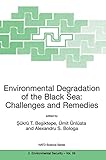Environmental degradation of the black sea : challenges and remedies [Libro electrónico] / editors: Sükrü T. Beşiktepe, Ümit Ünlüata, Alexandru S. Bologa
Beşiktepe, Sükrü T [editor] | Ünlüata, Ümit [editor/a] | Bologa, Alexandru S [editor/a].
Tipo de material: Libro
en línea Editor: Dordrech: Springer science, c1999Descripción: vi, 393 páginas : diagrs., gráf., ilustraciones, mapas ; centímetros.ISBN: 0792356764; 9780792356769; 9789401145688 (Online).Nota de acceso: Disponible para usuarios de ECOSUR con su clave de acceso Nota de bibliografía: Incluye bibliografía Número de sistema: 57197Resumen:
Libro
en línea Editor: Dordrech: Springer science, c1999Descripción: vi, 393 páginas : diagrs., gráf., ilustraciones, mapas ; centímetros.ISBN: 0792356764; 9780792356769; 9789401145688 (Online).Nota de acceso: Disponible para usuarios de ECOSUR con su clave de acceso Nota de bibliografía: Incluye bibliografía Número de sistema: 57197Resumen:| Tipo de ítem | Biblioteca actual | Colección | Signatura | Estado | Fecha de vencimiento | Código de barras |
|---|---|---|---|---|---|---|
| Libros | Biblioteca Electrónica Recursos en línea (RE) | Acervo General | Recurso digital | ECO400571977517 |
Incluye bibliografía
Disponible para usuarios de ECOSUR con su clave de acceso
The Black Sea presently faces severe ecological disequilibrium due primarily to eutrophication and other types of contaminants, from atmospheric, river and landbased sources. Major contaminants include nutrients, pesticides, hydrocarbons and heavy metals. Among the most critical contemporary concerns are eutrophication and associated deterioration of water quality, plankton blooms, hypoxia and anoxia, loss of biodiversity and decline of living resources. A better understanding of conditions leading to eutrophication and of the associated changes during the last four decades, is being carried out at national, regional and international levels. High quality scientific research has been conducted in all Black Sea riparian countries (Bulgaria, Georgia, Romania, Russian Federation, Turkey, Ukraine). In addition, several successful regional research programmes (e.g., CoMSBlack, NATO-TU Black Sea, NATO-TU Waves, EC-EROS 2000 Phase III, IOC Black Sea Regional Center with Pilot Projects 112) and one major environmental management program (GEF-BSEP) have been successfully launched. New international efforts like the Black Sea Commission, the Black Sea Program Coordination Unit, the Black Sea Economic Cooperation (all situated in Istanbul), together with the Convention for the Protection of the Black Sea against Pollution (Bucharest, 1992) and the Odessa Interministerial Decleration (1993) attest to the economic and political importance of these problems and the attention presently paid to this endangered sea." eng
Disponible en línea
Disponible en formato PDF
Subscripción a ELSEVIER 26 de diciembre del 2013
